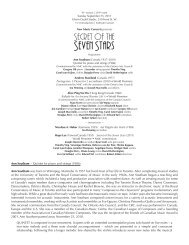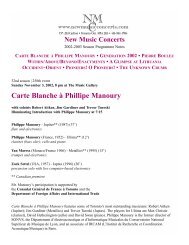2004-2005 Season The Hammerhead Consort - New Music Concerts
2004-2005 Season The Hammerhead Consort - New Music Concerts
2004-2005 Season The Hammerhead Consort - New Music Concerts
You also want an ePaper? Increase the reach of your titles
YUMPU automatically turns print PDFs into web optimized ePapers that Google loves.
Leopold Stokoswki premiered his Antiphonie in Carnegie Hall, a work still frequently performed to this day.<br />
Ever since, his works have been performed in major European cites, in Russia, Japan and China as well as in<br />
the United-States and South America, under the direction of such reputable conductors as Monteux, Ozawa,<br />
Meta, Decker and Abbado. François Morel was also highly involved in the Quebec music scene in bringing<br />
about and producing events for the concert scene, recordings, theatre, radio and television. For over 25 years,<br />
he was a freelance composer and conductor for the Société Radio-Canada. He was one of the founding<br />
members of the Société de Musique de Notre Temps, of the ditions Québec-Musique as well as the founder<br />
and artistic director for the Ensemble Bois et Cuivres du Québec. François Morel, now a retired professor,<br />
taught, between 1979 and 1997, analysis, composition and orchestration at the Faculty of <strong>Music</strong> of Laval<br />
University. He also conducted the contemporary music ensemble. He received the prestigious “Chevalier de<br />
l’Ordre national du Québec” in 1994 and the “Prix Denise-Pelletier” awarded by the Prix du Québec 1996.<br />
François Morel - Paysage dépaysé (1990)<br />
Commissioned by the CBC English network to commemorate the twenty-five year career of the prestigious<br />
Orford Quartet, Paysage dépaysé or Disoriented Landscape presents this ensemble joined by a second cello.<br />
<strong>The</strong> work is divided into five large sections, which are, in turn, divided into subsections. <strong>The</strong> number five is<br />
dominant at all levels of the work – intervals, rhythms, duration – which appears less as fetishism, but rather<br />
as ubiquity in all aspects of the structure. From neutral harmonic ideas and their derivations, as the only<br />
invention from this material, the work unfolds more in the sense of elimination than development.<br />
Three signals, in ostinato form and perpetual motion, although simple in appearance, suggest the ambiguity of<br />
the form and the legitimacy of the title Paysage dépaysé, also the title of a poem written in 1946 by French<br />
Canadian poet Gilles Hénault.<br />
Composition of this work is solely based on the notion of musical grammar, craftsmanship with intransigence<br />
in handling a minimum of constructive logic, choice of timbre and colour characteristic of the instrumental<br />
ensemble.<br />
SERGE GARANT<br />
— François Morel<br />
Serge Garant was born in Québec City in 1929. Between 1946 and 1950, he studied piano with Sylvio<br />
Lacharité and Yvonne Hubert, harmony with Paul Robidoux and composition with Claude Champagne. Later,<br />
in Paris, he audited courses on analysis given by Olivier Messiaen. He also worked on counterpoint with<br />
Andrée Vaurabourg-Honegger and met Stockhausen and Boulez. In 1954 Garant organized Montréal’s first<br />
contemporary music concert in which he participated with François Morel and Gilles Tremblay. He was the<br />
first Canadian composer to introduce tapes into a musical composition (in Nucléogame, 1955), and he made a<br />
first attempt at aleatoric technique in 1959 with Pièces pour quatuor à cordes. Garant was one of the founders<br />
of the Société de musique contemporaine du Québec (SMCQ), the oldest organization of its type in the<br />
country, which he directed from its establishment in 1966 until 1986.




